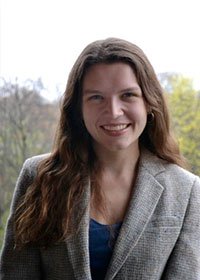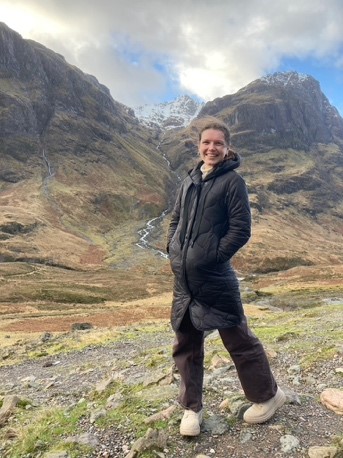Fulbright Chronicles, Volume 2, Number 3 (2023)
Author
Catherine Devlin

Abstract
My experience teaching Scottish high school students during my Fulbright year guides my disappointment regarding the recent United States Supreme Court ruling against affirmative action. Working as a tutor for Widening Participation – a program which provides adjusted entrance requirements for underserved students – showed me the value of diverse opinions in the academy. Upon returning to the United States, I will use my Fulbright experience to continue to work towards educational equity.
Keywords
affirmative action • college admissions • Scotland • widening participation • higher education
Teaching and Learning from Underserved Scottish Students
I learned a lot about America from teaching teenagers about Scotland.
I moved to Glasgow to study Gender History as a Fulbright Postgraduate Grantee. My research focused on understanding and correcting historiographic oversights that obscure women’s stories. This research bridged my transition from mass media storytelling, having previously served as the lead researcher for NBC’s 2020 documentary Sky Blossom, to a career in education as a sixth-grade history teacher. Whether in film or in the classroom, I hope to decrease inequities in how we remember and who has access to history.
As a beneficiary of the Fulbright Program – a fellowship program created by Senator William Fulbright to promote bilateral intellectual exchange – I was eager to learn about Scottish culture and to share my experience of being American. In line with this goal, I took a job as a Widening Participation tutor in the Top Up Programme. Top Up is a six-week study skill course which provides adjusted university entry requirements to students who live in Scotland’s lowest income zip codes, serve as caregivers, are estranged from their families, or have refugee status. Admissions requirements into higher institutions vary by undergraduate program and personal circumstances. For instance, a student hoping to study history would typically require five A’s on their Scottish Qualification Authority (SQA) exams to be guaranteed a university spot, but a student who had completed Top-Up and served as a caregiver would be guaranteed an offer with an A and four B’s.
The Top-Up program seeks to correct inequities stemming from the structure and history of the Scottish education system. Like the United States, Glasgow students are assigned to secondary schools based on their home zip code. While families are able to request that their local council change their students’ school placement, in 2016 just 32% of these requests were accepted. Scottish university admissions criteria center around test results, meaning that a student’s academic career is almost entirely shaped by the quality of their secondary education. In some parts of Glasgow, more students get sent to prison each year than are admitted to the University.
Having lived in Scotland for only a month, I was tasked with teaching Scottish students about their own national identity. I soon realized that the apparent irony of this assignment inspired incredible conversation and cultural exchange.
Top-Up sections are divided into topics that guide a final essay question. My group studied the impact of Scottish stereotypes. I was intrigued by the challenge of this allocation. Having lived in Scotland for only a month, I was tasked with teaching Scottish students about their own national identity. I soon realized that the apparent irony of this assignment inspired incredible conversation and cultural exchange. The students eagerly sought my opinion of Scottish culture as a foreigner, and they responded with their beliefs about the United States. On both sides, we had a lot to learn and celebrate. When a session fell on Thanksgiving, the students listed things they were grateful for (but refused to believe that pumpkin pie is delicious). When the Scottish holiday Burns Night approached, we read the poems from the celebration’s namesake (and I strongly objected to the pumpkin pie debate when I learned what was in haggis).
The students faced stereotypes beyond kilts and bagpipes, however. As Widening Participation students, many of their university peers considered them to have reached university through a “back door.” The students confided in me their worries about not fitting in or belonging in higher education. When I asked them to write down the first word that they associated with the University of Glasgow, the most frequent answer was “posh,” followed by “accent” (referring to the fancy accent associated with the university as opposed to the rest of Glasgow). “Snobby” was also on the leaderboard, and one student expanded beyond a single word to write “it only has students from private schools.” My students viewed the university as a far off, inaccessible place, not meant for them.
Connecting Widening Participation to Affirmative Action
My students concern about the “fairness” of their admission mirrored conversations in the United States regarding affirmative action. On June 29, 2023, the United States Supreme Court ruled that colleges cannot consider race as part of the admissions process. This ruling ended affirmative action, a decades-long initiative to combat race-based discrimination in employment and education. Speaker of the House Kevin McCarthy (R) commended the decision, saying it allows students to “compete based on equal standards and individual merit.”
But this outlook assumes that college admissions practices are based on equal standards and individual merit. Race affects experience, and college applications are incomplete without this part of identity. The United Nations declared intersectionality – the recognition that different social identities create unique forms of discrimination – as necessary in combatting inequality. To remove considerations of race from college admissions forces admissions committees to make judgements without seeing the full picture. Contrary to Representative McCarthy’s remarks, these committees are less able to ascertain a student’s individual merit.
Furthermore, the Supreme Court decision falsely implies that students admitted under affirmative action do not belong at universities. In the case of my Scottish students, who faced similar criticism, their nontraditional path to university in no way affected their success. A sixteen-year survey of 30,000 Top-Up students showed that students who participated in the program had the same likelihood of graduating with first class honors as any other student.
In admitting these students, the university not only chose applicants who were likely to be successful, it also increased the diversity of its student body which improves research quality and promotes innovation. Policies promoting diversity benefit institutions. A 2022 study of 13,000 legal articles found that law reviews which actively sought diverse writers saw their volume citations increase by 23% over a five-year period. We learn more outside of echo chambers.
Implications for the Future of American Higher Education
As an American in Scotland, I saw how quickly we form and strengthen stereotypes. While my Glaswegian students worried that their accents would make them appear less educated to their university peers, one student argued that it was better than having an American accent. Her classmate quickly disagreed: “Americans don’t sound smart, but they sound rich. Catherine sounds like a movie star.”
The United States is certainly a popular culture giant, but it is also a global leader in higher education. Yet with falling enrollments and skyrocketing prices, a 2023 Wall Street Journal poll found that most Americans are no longer convinced of the value of a college degree. The recent Supreme Court ruling against affirmative action will continue the downwards trajectory of American universities. Removing affirmative action will not increase the caliber of students, it will only decrease diversity, thus harming university outcomes.
In August, I returned to a less equitable America than the one I left last year. I now teach at a charter school in Boston. My students are primarily low-income students of color. In the words of former first lady Michelle Obama, these students will have to “sweat a little more to climb the same ladders” as their more privileged peers. Their sweat will push our nation forward.
It is a tragedy that we ask this of them.
Notes
- University of Glasgow. (2023). Adjusted Entry Requirements for 2023 Entry. [Booklet]. Retrieved from University of Glasgow’s website: https://www.gla.ac.uk/media/Media_922750_smxx.pdf
- Browitt, A., Croll, N., Hedge-Holmes, K., & Henry, K. (2023). The Top-Up Programme: Two decades of widening participation provides evidence of impact on student success against a background of socio-economic disadvantage. Widening Participation and Lifelong Learning, 24.3, 10-32.
- University of Glasgow exceeding Scot Gov deprivation target. (2023, May 2). The Herald. Retrieved from The Herald’s website: https://www.heraldscotland.com/business_hq/23491786.university-glasgow-exceeding-scot-gov-deprivation-target/?ref=twtrec
- Chilton, A., Driver, J., Masur, J., & Rozema, K. (2022). Assessing Affirmative Action’s Diversity Rationale. Columbia Law Review, 122.2, 331-406.
- Belkin, Douglas (2023, March 31). Americans are losing faith in college education, WSJ-NORC poll finds. The Wall Street Journal. Retrieve from The Wall Street Journal’s website: https://www.wsj.com/articles/americans-are-losing-faith-in-college-education-wsj-norc-poll-finds-3a836ce1

Biography
Catherine Devlin was the 2022-2023 Fulbright Postgraduate Grantee at the University of Glasgow. Before completing her Fulbright, she worked as the lead researcher and associate producer of the 2020 NBC documentary Sky Blossom. She teaches sixth grade history at a Boston charter school. She can be reached at catherine.devlin@fulbrightmail.org
